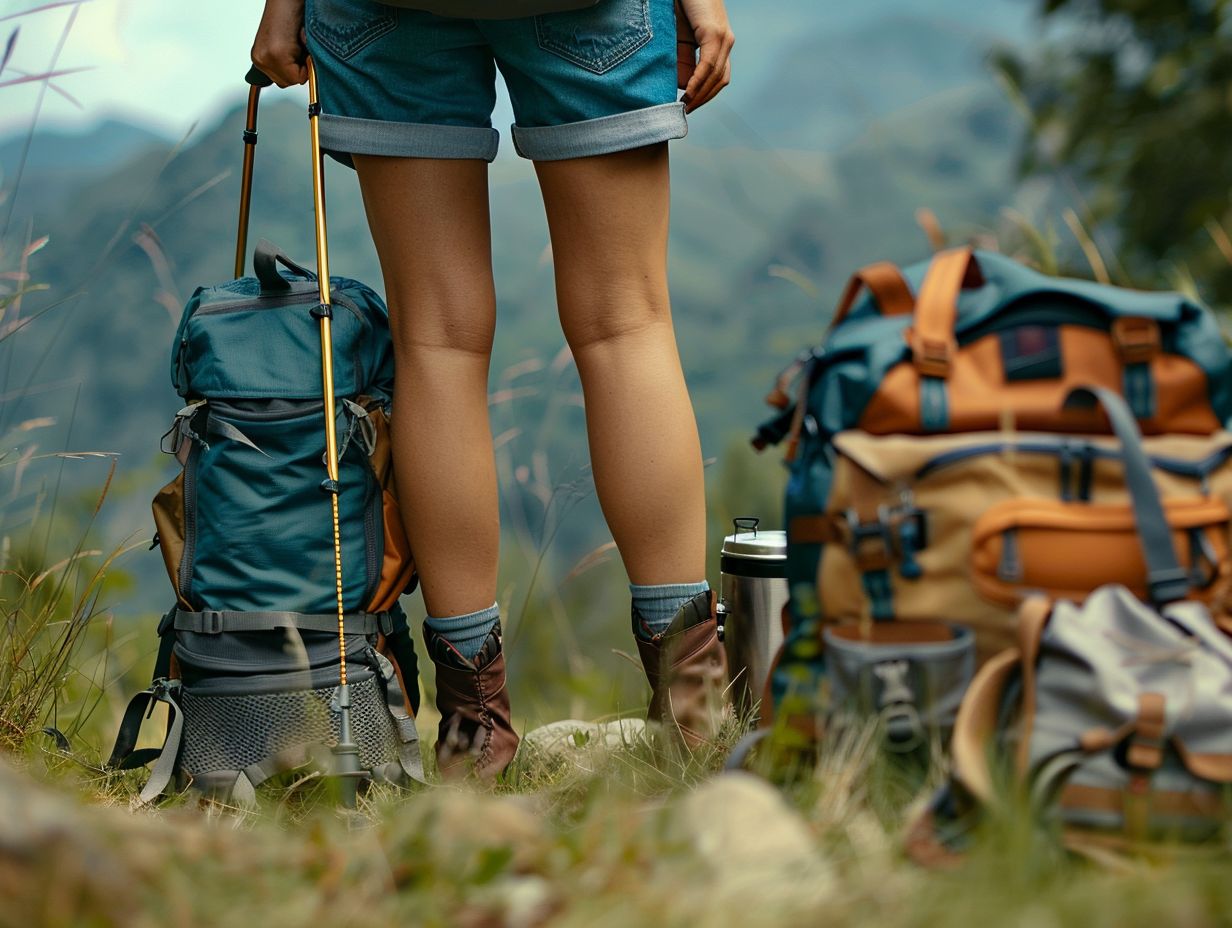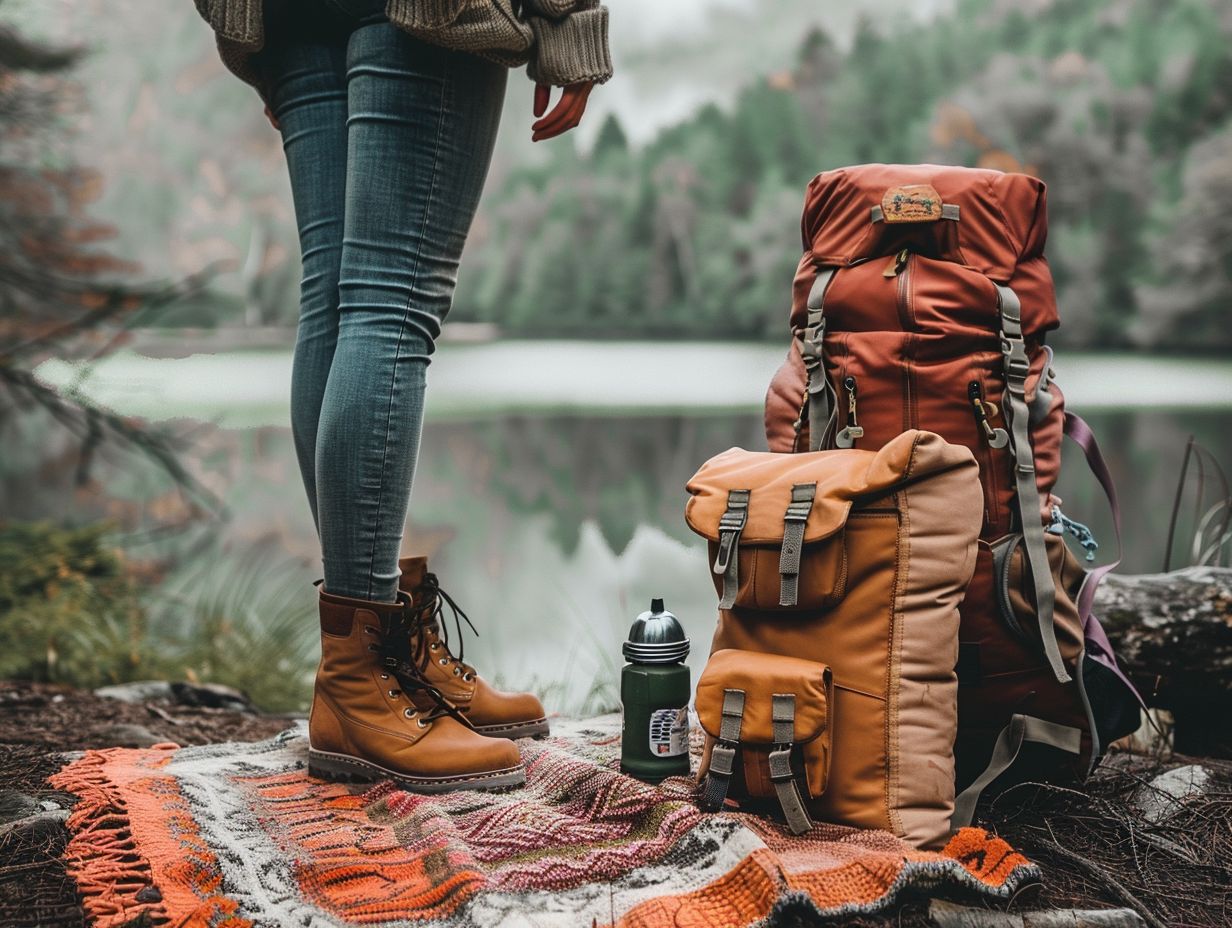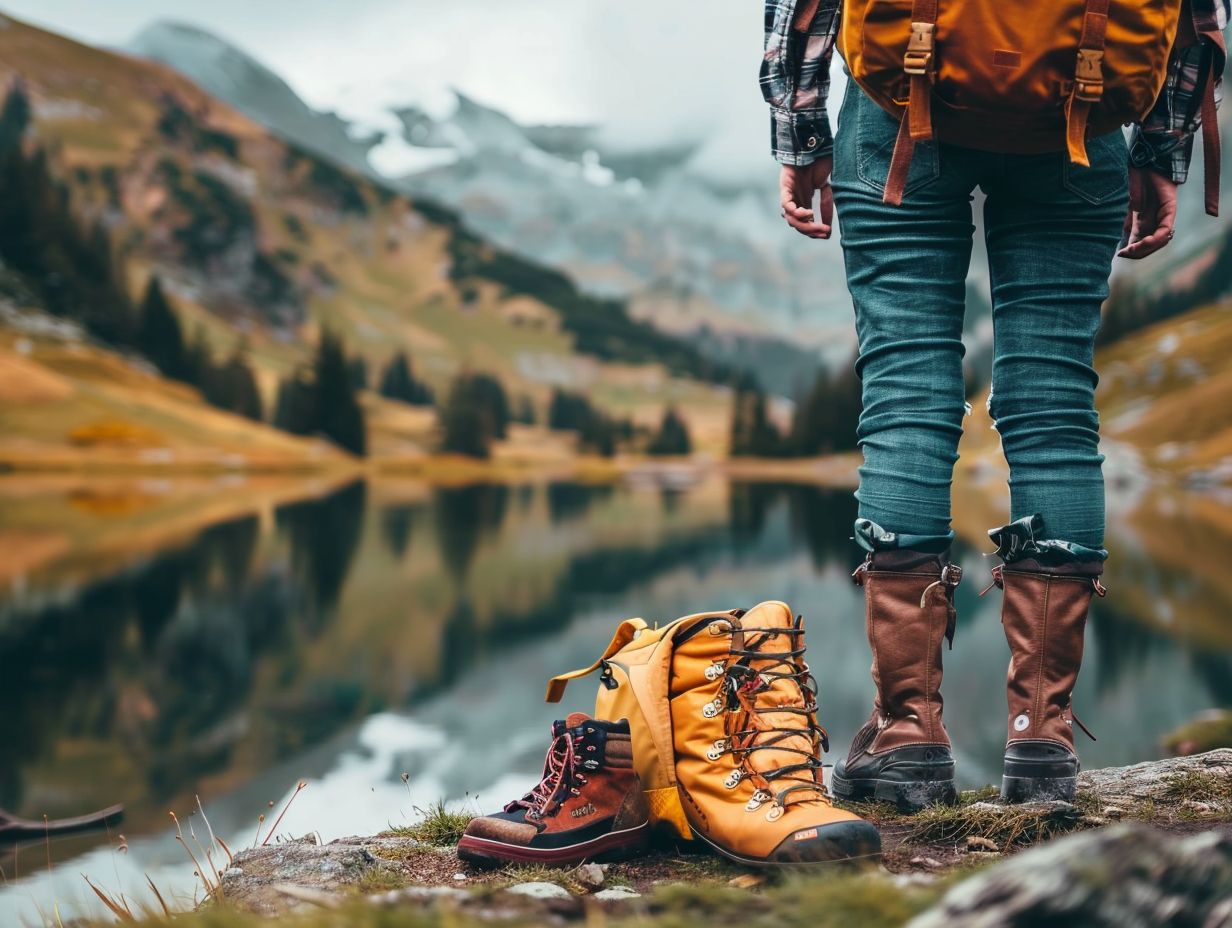When heading out for a camping trip, packing light can enhance your adventure, making it more enjoyable and convenient. The advantages of packing light for a camping trip, essential items to bring, efficient packing tips, and items to consider leaving behind are all discussed. By minimising strain on your body and streamlining travel logistics, we aim to equip you with the knowledge necessary to pack efficiently for your upcoming outdoor excursion.
Key Takeaways:

- Pack light to make your camping trip easier on your body and more efficient.
- Essential items for camping include clothing, shelter, and food.
- Efficient packing tips include using multi-purpose items and distributing weight properly.
Benefits of Packing Light for a Camping Trip
When you embark on a camping trip, the advantages of travelling light are significant. By adopting a minimalist camping approach and bringing only the essentials, you not only decrease the physical strain on yourself but also enrich your overall outdoor experience amidst the marvels of nature and adventure.
Travelling with a lightweight backpack and minimal camping gear enables you to move more freely and navigate various terrains without feeling burdened. While hiking through scenic landscapes or setting up camp under starry skies, the simplicity of your equipment fosters a sense of calmness and a heightened connection with the natural world.
Embracing minimalism also promotes resourcefulness and creativity, as you discover ways to maximise your resources, cultivating a deeper appreciation for the mutual relationship between humans and nature.
Less Strain on Your Body
When you pack light for your camping trip, it will significantly reduce the strain on your body, allowing you to enjoy nature, adventure, and the camping experience without unnecessary burdens.
Carrying a lighter rucksack will make walking along trails much more enjoyable and less tiring for you. The reduced weight on your shoulders and back will enable you to move more freely and sustain your energy levels for longer periods.
This increased agility will grant you access to explore off-the-beaten-track locations and undertake longer walks with ease. With less fatigue to manage, you can fully engage in the tranquillity of nature and optimise your outdoor adventure.
Easier and More Efficient Travel
Travelling light for your camping adventure not only simplifies the journey but also enhances efficiency, allowing you to concentrate on the splendour of nature, the excitement of adventure, and the conveniences of RV camping without unnecessary items or equipment.
By including essentials such as versatile multi-purpose tools, lightweight camping gear, and quick-dry clothing in your packing list, you can readily adjust to diverse climates and terrains while optimising your outdoor experience.
Opting for compact and sturdy equipment like a collapsible water bottle, portable camping stove, and a high-quality sleeping bag facilitates seamless transitions from hiking trails to cosy campfires under the stars.
Investing in premium outdoor footwear guarantees comfort and support during extended days of exploration, whether navigating rugged mountains or strolling along sandy beaches, thereby ensuring a memorable and enjoyable camping trip.
Essential Items to Pack for a Camping Trip
When preparing for a camping trip, you must pack essential items to guarantee a comfortable and enjoyable outdoor experience. Each item, from camping gear to toiletries, sleeping bags to food supplies, plays a crucial role in enhancing your camping adventure amidst nature.
Good quality camping gear, such as a sturdy tent, sleeping mat, and camping stove, not only provides comfort but also ensures safety during your stay in the wilderness.
Toiletries like biodegradable soap and quick-dry towels help maintain hygiene while minimising environmental impact. Proper hiking boots and clothing suited for outdoor activities are essential for exploring the terrain comfortably.
Stocking up on non-perishable food items and clean drinking water is key to keeping your energy up and staying nourished throughout the trip.
Clothing and Footwear

In terms of preparing for your camping trip, selecting appropriate clothing and footwear is crucial to ensure your comfort, protection, and adaptability to various climatic conditions and outdoor activities.
When choosing outdoor trousers, the material plays a significant role. It is recommended to opt for quick-drying and moisture-wicking fabrics to keep you dry and comfortable during hikes or unexpected rain.
Layering is a fundamental strategy for camping attire. Make sure to pack versatile pieces like thermal base layers, insulating mid-layers, and waterproof outer shells to easily adjust to fluctuating temperatures.
For swimwear, it is important to select durable options that dry quickly and offer UV protection, especially if you plan to engage in water activities at the campsite.
Additionally, ensure you have the appropriate footwear for different terrains. Consider hiking boots for rugged trails, water shoes for river crossings, and lightweight sandals for casual walks around the campsite. These choices will contribute to a comfortable and enjoyable camping experience.
Shelter and Sleeping Gear
Ensuring that you have proper shelter and sleeping gear is essential for a successful camping trip. This equipment provides comfort, safety, and warmth in the midst of nature’s beauty and potential challenges such as bugs and mosquitoes.
In terms of selecting camping gear, opting for a lightweight backpacking tent with good ventilation can greatly enhance your camping experience. These tents allow for easy setup and provide protection from the elements.
Choosing the right sleeping bag is crucial for a restful night’s sleep. Consider factors such as temperature rating, material, and weight to ensure that you stay cosy throughout the night.
Investing in insect protection measures, such as bug repellents, mosquito nets, and insect-repellent clothing, can help in keeping unwanted critters at bay during your camping trip. Lastly, remember to prioritise campfire safety. Select a suitable fire ring, keep a water source nearby, and always fully extinguish the flames before retiring for the night. These measures ensure a safe and enjoyable camping experience.
Food and Cooking Supplies
When planning your camping menu, it is essential to pack the necessary food and cooking supplies for sustenance, hydration, and enjoyment around the campfire with simple yet nourishing meals.
Meal planning plays a crucial role in ensuring you have a well-rounded camping experience. Opt for lightweight, non-perishable items that are easy to prepare, such as dehydrated meals, granola bars, and tinned goods.
Don’t forget to bring along high-energy snacks like trail mix and fruit for quick boosts throughout the day. Plus food, remember to pack essential camping cooking supplies, including a portable cooker, pots and pans, utensils, and biodegradable soap for washing up to maintain hygiene and environmental awareness.
Tips for Efficient Packing
Efficient packing is crucial for a successful camping trip, and you can achieve this by utilising packing organisers, making smart clothing choices, and ensuring you have gadget essentials to enhance your outdoor experience.
To excel in the art of packing light for your camping adventure, consider incorporating compressible packing cubes or dry bags into your packing routine to optimise the space in your rucksack. Choose versatile clothing options such as quick-dry fabrics that can be easily layered to accommodate varying weather conditions.
When preparing your smartphone essentials, remember to pack a portable charger, a waterproof case, and offline maps for navigation. Additionally, select practical yet comfortable footwear like hiking sandals or lightweight trail shoes to support your outdoor activities.
Utilising Multi-purpose Items
Maximising the use of multi-purpose items on your camping trip can help you in reducing weight, saving space, and enhancing functionality.
This approach enables you to carry fewer items while enjoying various conveniences. These versatile tools not only lighten your load but also serve multiple functions, making them critical gadgets for any outdoor enthusiast.
Investing in smartphone accessories that double up as camping tools, such as portable chargers with built-in torches or utility cases that store your phone and small necessities, allows you to streamline your gear.
Complementing these accessories with a lightweight rucksack designed with strategically placed compartments and attachment points further optimises your camping experience, ensuring easy access to all your essentials while on the move.
Properly Distributing Weight

Ensuring the even distribution of weight in your rucksack is crucial for achieving a well-balanced and comfortable camping trip, particularly when you are carrying items such as water filters, hydration packs, and sturdy boots for outdoor exploration.
Proper weight distribution serves not only to prevent strain on your back and shoulders but also to elevate your overall hiking experience. As you pack essentials like a lightweight camping stove, compact tent, and efficient water filtration system, it is important to strategically place them in your rucksack to ensure easy access when required.
Maintaining balance in your gear enables better stability on uneven terrain, enhancing the safety and enjoyment of your outdoor adventure. Therefore, dedicating time to effectively organise your rucksack can have a significant impact on your outdoor activities.
What to Leave Behind
When preparing for a camping trip, it is crucial for you to identify and exclude non-essential items that may contribute unnecessary weight and clutter to your campsite, enabling you to concentrate on the beauty of nature and the excitement of adventure.
By decluttering your camping gear, you not only simplify your experience but also enhance efficiency in setting up and packing down your campsite. It is advisable to prioritise the essentials such as a durable tent, sleeping bag, and cooking supplies over items like excessive toiletries or multiple electronic devices.
Adopting a more minimalistic approach allows you to fully engage with the tranquillity of the outdoors without distractions. Leave behind the constant buzz of smartphones and instead immerse yourself in the natural sounds surrounding you.
Non-essential Items
When embarking on a camping trip, simplify your packing and enhance your outdoor experience by leaving behind non-essential items such as excessive gadgets, duplicate clothing items, and unnecessary toiletry kits. Instead, focus on essential items like a durable tent, sleeping bag, cooking essentials, proper hiking shoes, and a first-aid kit.
It is common for campers to overpack with items like hairdryers, portable speakers, and multiple changes of clothes. Opt for versatile, quick-drying clothing suitable for the summer weather and pack light layers for unpredictable temperatures. For RV campers, prioritize essential accessories like levelling blocks, water hoses, and basic maintenance tools to ensure a smooth and stress-free camping experience.
Items Available at the Campsite
When you visit many campsites, you will find that they provide facilities and resources that can reduce the need to pack certain essentials. This includes items like toiletries, extra clothing, or specific camping equipment, which can enhance your outdoor experience and make it more convenient.
For example, campsites often have shower facilities available, so you can avoid packing bulky shampoo and body wash. Some places even offer hire services for equipment such as kayaks or bicycles, removing the need for you to transport these items yourself.
In addition, campsites typically sell insect repellent, sun cream, and other outdoor essentials to ensure you are protected and comfortable during your outdoor escapades.
If you happen to forget to bring comfortable footwear, many camp shops have a range of hiking boots and sandals for sale, enabling you to explore the paths without any discomfort.
Frequently Asked Questions
What are some tips for packing light for a camping trip?

When packing for a camping trip, it’s important to prioritize essential items and consider the weight and space restrictions of your mode of transportation. Some tips for packing light include: choosing multi-purpose items, packing versatile clothing, minimising toiletries, and utilising space-saving packing techniques.
How do I choose the right backpack for a light camping trip?
The right backpack for a light camping trip should be lightweight, durable, and have enough compartments to help with organization. Look for backpacks specifically designed for camping and hiking, with features like padded straps and adjustable waist belts for comfort.
What are some essential items to pack for a light camping trip?
Some essential items to pack for a light camping trip include a tent, sleeping bag, portable stove, water filtration system, first aid kit, and appropriate clothing for the weather. It’s also important to bring enough food and water for the duration of your trip.
How can I pack my clothes efficiently for a light camping trip?
Rolling your clothes instead of folding them can maximise space in your backpack. You can also use packing cubes or compression bags to further compact your clothing. Consider bringing clothes made of quick-drying fabric, as they can be washed and re-worn on a longer trip.
Is it possible to pack light for a camping trip with kids?
Yes, it is possible to pack light for a camping trip with kids. To do so, involve your kids in the packing process and prioritize essential items. Consider packing items that can serve multiple purposes, such as a blanket that can also be used as a picnic mat. Bring only the necessary amount of toys and games to keep your kids entertained without adding too much weight to your luggage.
Should I bring a separate bag for day trips during a camping trip?
It can be helpful to bring a small daypack for shorter excursions during a camping trip. This way, you can leave your heavier backpack at your campsite and only carry the essentials for the day. Make sure to choose a lightweight daypack and only pack the essentials for your day out, such as water, snacks, and sunscreen.



